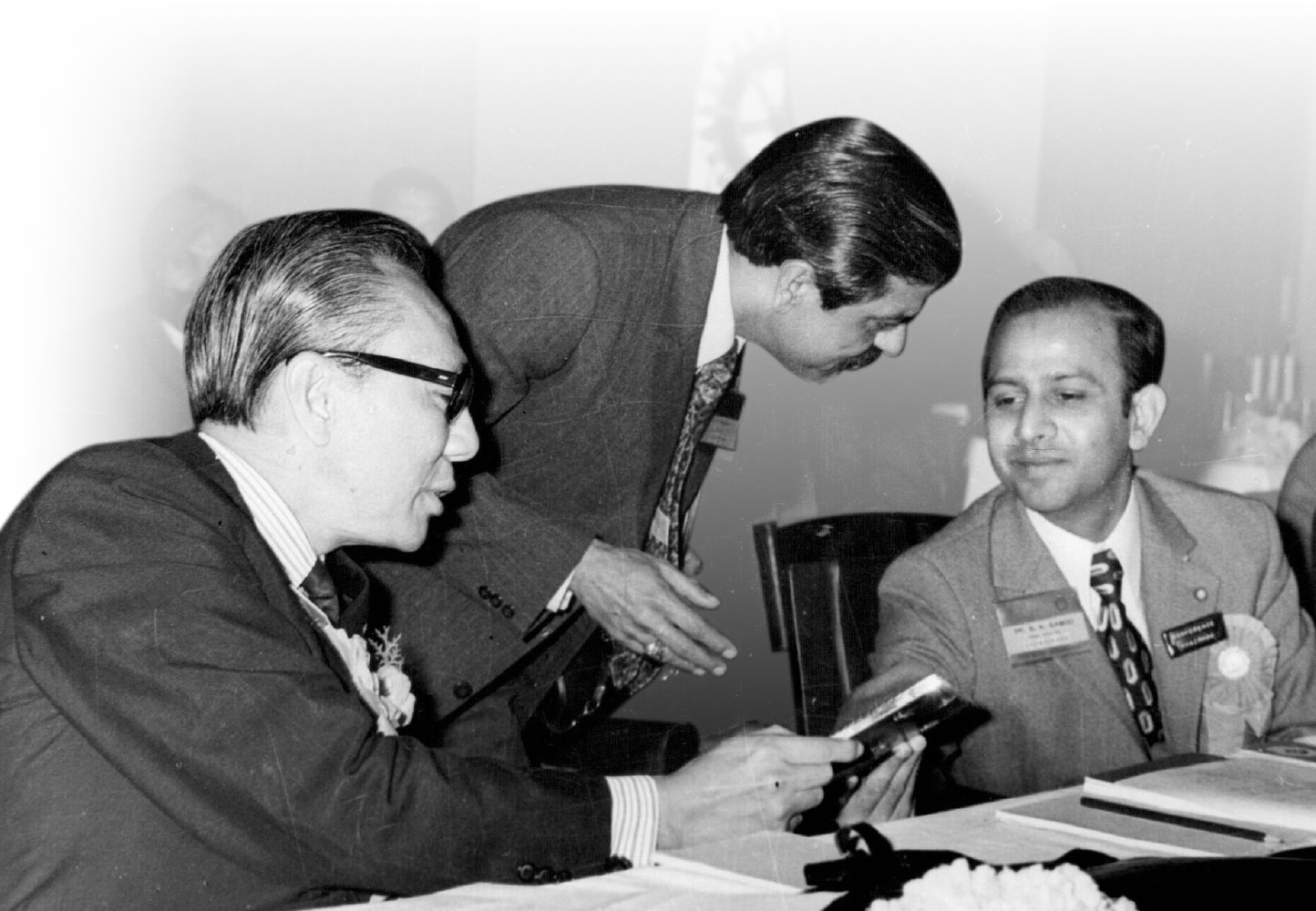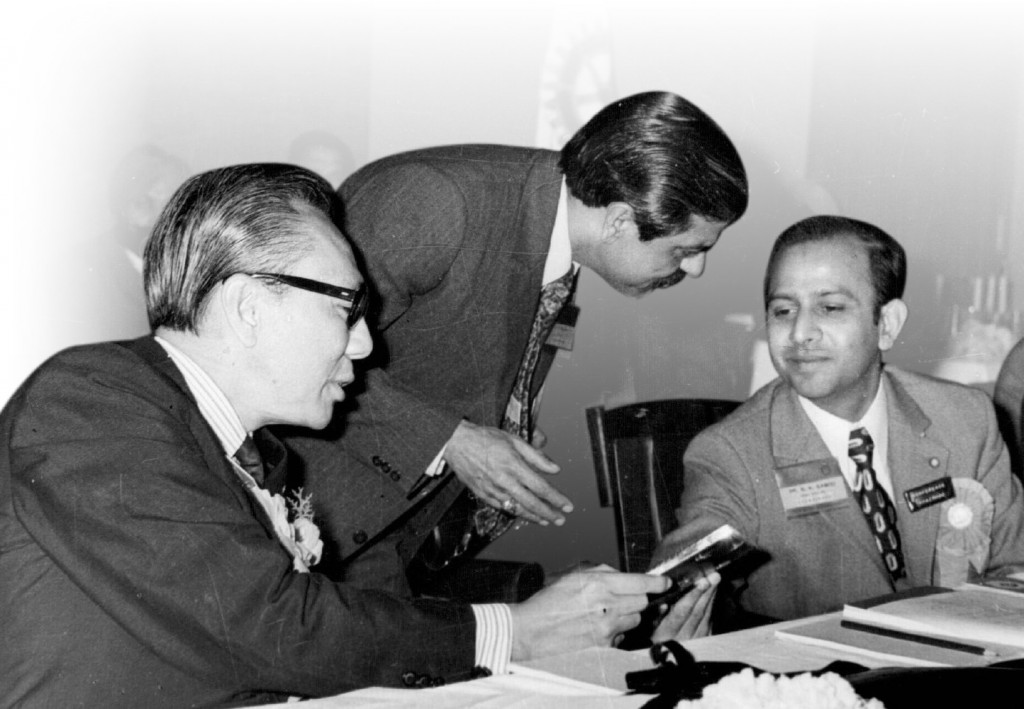
A person who did it his way to live his life was Bhichai Rattakul. A man with short temper, sometimes, to follow his values, be it in his politics, Rotary or family. I got to know him in December 1973 when he came to Chandigarh as RI President’s Representative at our District (then 310) conference, hosted by RC Chandigarh, where I was assigned conference chair by my club and endorsed the district governor J K Sethi. I got close to Bhichai, who had come alone. Our district was infamous for canvassing during governor’s election. Bhichai went to the three parties to know the canvassing. The conference was a great hit as I managed to get Vice-President of India G S Pathak.
Following the conference, as the chief guest, he attended our club meeting. There he nicknamed me ‘RK’. He also said that RK would rise in Rotary but not the way he saw, by canvassing. He was representing RI President the same year to D-315. He and his wife Charoye came to Calcutta (now Kolkata) in a train from Vijayawada, Andhra Pradesh. They were in first class but had no beddings and they would spend two nights. I happened to be in Calcutta and arranged their stay at my home. They were going to Guntur, Andhra Pradesh, where the DG was V Umamaheswara Rao. Bhichai would go to any place for serving Rotary.
Bhichai Rattakul had an aura and was so honoured that all doors would open to him, be it the office of the Prime Minister or senior executives or at the airport.
Bhichai was a very senior Rotarian, having joined RC Dhonburi, Bangkok, in 1958 and became district governor in 1963. He should have been RI director earlier, but was victim of a geographical distribution. Zone 2 then comprised whole Southeast Asia, up to Taiwan. The maximum districts were in South Korea and the Philippines, which had the maximum votes, so the two countries alternated the RI directorship. Bhichai always lost in the election. In the 1986 Council on Legislation, an additional RI director was included, the RI Board assigned an area, with new enactment, and Singapore, Malaysia and Thailand were given an additional RI director. Consequently, Bhichai became director in the year 1990–92, and was on the RI Board when I became RI President in 1991–92. I had him as the chairman of Executive Committee of the Board, and often said openly I’d be privileged to swap the positions since he was of much higher seniority.

Despite his seniority he gave me utmost respect as RI president whether in board meetings or when he joined me for visits or assigned any Rotary task. I was informed about a canvassing in my district 3080 and requested Bhichai to visit Chandigarh to gauge the reality. PRID Y P Das was one of the candidates and Bhichai was known to his father. Bhichai gave the actual situation and his report was put to the board meeting. When the item came up I asked Vice-President Glenn Estess to chair and I withdrew. The board took the decision based on Bhichai’s report that the election was vitiated, and re-election was ordered without disqualifying any candidate since there was no proof. Bhichai was always astute and fair, following Rotary edicts.

When Usha and I visited Bangkok, he arranged our audience with the King of Thailand. We had been flying 6–7 hours from Tokyo to Bangkok. Bhichai arranged for Usha and me to change at the airport VIP lounge as we had to go directly to the palace. When we met the king, I could see how much respect he gave to Bhichai; as if he was part of royalty. Indeed, Bhichai had an aura and was so honoured that all doors would open to him, be it the office of Prime Minister or senior executives or at the airport. In my three days in Bangkok, I realised that in addition to his political positions and responsibilities he gave full time to Rotary.
He created an official Rotary Centre in Bangkok through Thai Rotarians’ contributions and initiated the Thai language literature. This multiplied the number of members.
Bhichai Rattakul was educated in Bangkok and Hong Kong, and held high degrees. A Member of Parliament for nine terms since 1969 and leader of the Democrat Party, he had served his country as foreign minister, deputy prime minister, speaker of the House of Representatives and president of the parliament. He had also led many Thai delegations to the United Nations. Bhichai Rattakul was honorary vice-president of the Thai Scout Council. He served as chairman of the Anti-Corruption Commission, Anti-Drugs Commission, National Audit Commission and the 13th Asian Games Organising Committee. He was decorated with Special Class Honor from the King of Thailand and honours from the emperor of Japan, presidents of the Philippines, Korea, Austria, and Nicaragua. He was also awarded the highest International Olympic Award and the Asian Olympic Award by the International Olympics Committee.

He was married to Khunying Charoye Rattakul and had two sons and one daughter. Charoye passed away in June 2014. Both Usha and I have been very close to Charoye as we were with Bhichai. Bhichai was truly a hands-on service man. He mentioned to me that he was a Rotarian just in name when he joined the club and felt an honour to be a member of Rotary. It so happened that the club was taking out a group of fatherless children to the beach. One of the volunteers from the club dropped out and Bhichai was requested if he could fill in. He was annoyed at first but after persuasion reluctantly joined.
Each Rotarian was asked to care for one child. Bhichai had a little boy to care for and play with him. On conclusion of the visit, all other children had gone. It was getting dark and this child continued to sit with Bhichai and said “I wish you were my Dad.” Bhichai told me that the time spent with this child was one of the most valuable times of his life and made him a real Rotarian, and made him realise the meaning of the words ‘Service Above Self’. Bhichai had many other projects including the Lighthouse Literacy project working together with Australian and Thailand clubs, and this was most significant as the project got implemented in many countries. Bhichai created an official Rotary Centre in Bangkok through Thai Rotarians’ contributions and initiated the Thai language literature. This multiplied the number of members.

Bhichai became RI president in 2002–03. He was president-elect when he addressed the Rotary annual convention in Barcelona, Spain. He was candid and forthright in his comments, be it in board meetings as a president-elect or president and even later in the Council of Past Presidents. He did so without any fear or favour even if the comment was against any past presidents in our group, if there were violation of Rotary policies or values.
When he was president he asked me to chair the Peace Conference to be organised in Kuala Lumpur. This was to be organised by the RI staff, and I together with two-three secretariat staff members visited the venue to decide the hotel and logistics. I had differences with the staff members and they diferred with me and put their recommendation. I sent my resignation to President Bhichai that I could not work with this staff committee and Bhichai immediately gave the order that whatever instructions I gave would be the final word. Such a strong man Bhichai was. The conference became successful far beyond expectations and all those who attended were happy about the programme, speeches, fellowship and camaraderie. Bhichai truly proved himself once again a true leader.
He was an orator par excellence and was requested by many incoming RI presidents to speak at the International Assembly. His fame as an orator preceded him, and after he spoke, there was a standing ovation which was not normal. His way of speaking was soft, having the content of humanity with stories, talking about the integrity and values of Rotary. His theme as RI president was very action oriented — ‘Sow the Seeds of Love’ — and this is how, many times during his year as president, and even later, he would define the true meaning of love in the larger sense.
Whenever I visited Bangkok, whether as chair of the Foundation or later on way to medical missions, I was always invited by Bhichai to a very special restaurant which had Indian food. In the later years, he invited me to his home when Charoye had gone and his hospitality was remarkable. Bhichai has created leaders from Thailand in Rotary like PRID Noraseth Pathmanand and few others. When the convention was planned in Bangkok under the leadership of RI President Kalyan Banerjee he was agitated because Kalyan had appointed Past RI Director O P Vaish on my recommendation. Bhichai wanted the conference chairman to be from Thailand, and recommended Noraseth. K R Ravindran, who was treated as a son by Bhichai, went to Bangkok to calm him down and persuaded him to actively support the convention. I met him too, indirectly indicating my rationale. Bhichai would always give regard to my suggestion.
Ravindran was close to him. Bhichai came to bless Ravi’s daughter Prashanthi’s wedding in Thailand, and went all the way to attend his felicitation when he became RI president. I was there too. Bhichai spoke profusely about Ravi. Bhichai had tremendous self-respect, sometimes beyond logic. As chair of the Rotary Foundation he asked for credit card for official expenses. He was annoyed because he felt he should automatically get a credit card, and not have to ask for it. On that point, he resigned from the chair of the Rotary Foundation. He, however, continued to serve Rotary as he initiated and pursued a short course as a Rotary Peace Fellow at the University of Chulalongkorn in Thailand. This was an astounding success and was replicated in Uganda.
I asked Bhichai one day what is the meaning of his name and he explained that much of Indian culture had touched Thailand which was then known as Siam and his name Bhichai meant ‘vijay’ or ‘victory’. Bhichai had intimated to me that Charoye was given a funeral in a royal reserved area and he would also want his place next to Charoye’s memorial. He did it his way, always. He was very fond of Frank Sinatra and used to sing ‘I did it my way’. Truly Bhichai lived and died his way.
The writer is a past RI president






